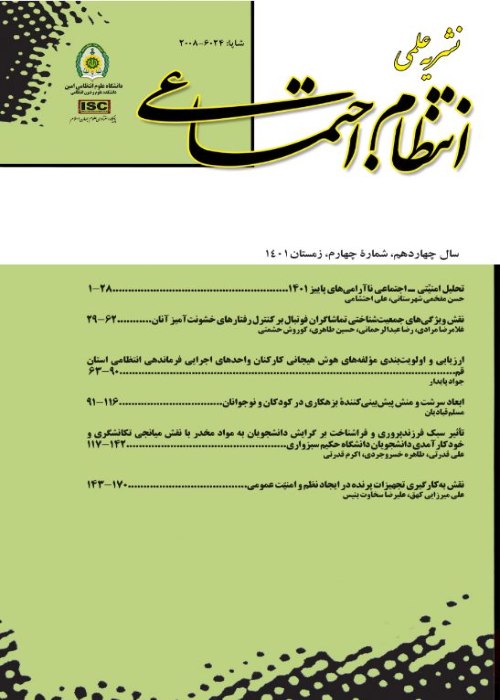Theoretical Concepts and Foundations on the observance of the Right to Silence and Access to Lawyers in the Interrogation Process by the judiciary Officers
Author(s):
Article Type:
Research/Original Article (دارای رتبه معتبر)
Abstract:
Background And Objectives
Interrogation of the defendants is the center of gravity of preliminary research. Considering the necessity of supporting the principle of innocence and preserving human dignity in the process of fair trial, the main lines of the rights of defense for individuals (including the right to remain silent and access to a lawyer) during the interrogation (both global and regional) have been identified at this stage as per international human rights documents. Hence, the recognition of these constructive and strategic principles governing the fair trial, either from the point of view of the specific or common features of these principles or from the point of view of recognizing the bases governing them, is the starting point for drawing the relationship between these principles and the interrogation process followed by the identification and determination of various sanctions which ensures the good flow of these principles in the process of interrogating by the judiciary officers, which is discussed in this article.Methodology
According to the research objectives, its nature is applied and the method of this study is descriptive-analytical and applied, and in terms of its implementation, it is library by using a note-talking tool. The statistical population of this research includes all documents, rules and documents in the field of research.Results and
Results
The results showed that the theoretical foundations of observing the right of silence and access to a lawyer in the process of interrogating the judiciary include five types; 1- Respect for human dignity; 2- Assumption of innocence; 3- Ensuring the defendant's right to defense; 4- The principle of equalization of weapons; 5- Appropriate status for international documents and domestic law. Each of which was fully recognized, as an instrument for the correct interpretation of the law in order to safeguard the basic principles of the proceedings, in order to be an essential yardstick for assessing and evaluating the validity of decisions of the judiciary for the compliance with the fundamental principles.Language:
Persian
Published:
Entezam - e - Ejtemaei, Volume:9 Issue: 4, 2018
Pages:
221 to 254
https://magiran.com/p1831793
دانلود و مطالعه متن این مقاله با یکی از روشهای زیر امکان پذیر است:
اشتراک شخصی
با عضویت و پرداخت آنلاین حق اشتراک یکساله به مبلغ 1,390,000ريال میتوانید 70 عنوان مطلب دانلود کنید!
اشتراک سازمانی
به کتابخانه دانشگاه یا محل کار خود پیشنهاد کنید تا اشتراک سازمانی این پایگاه را برای دسترسی نامحدود همه کاربران به متن مطالب تهیه نمایند!
توجه!
- حق عضویت دریافتی صرف حمایت از نشریات عضو و نگهداری، تکمیل و توسعه مگیران میشود.
- پرداخت حق اشتراک و دانلود مقالات اجازه بازنشر آن در سایر رسانههای چاپی و دیجیتال را به کاربر نمیدهد.
In order to view content subscription is required
Personal subscription
Subscribe magiran.com for 70 € euros via PayPal and download 70 articles during a year.
Organization subscription
Please contact us to subscribe your university or library for unlimited access!



